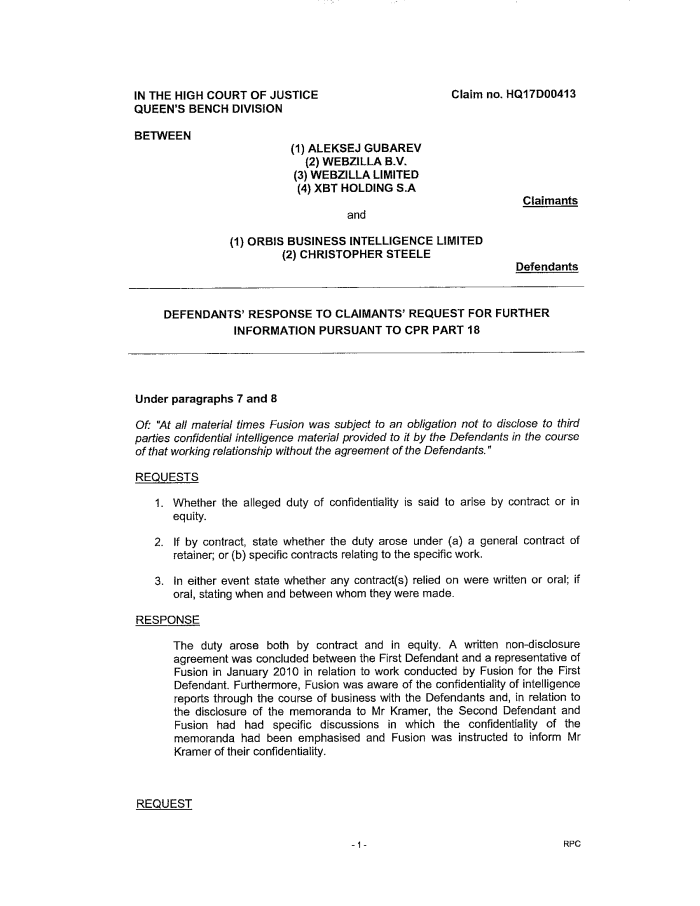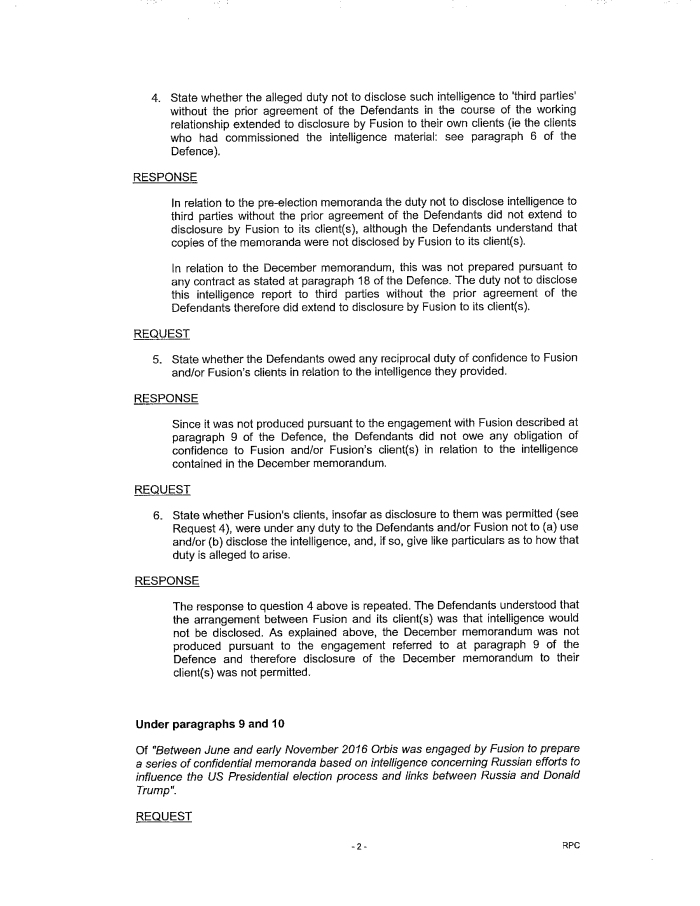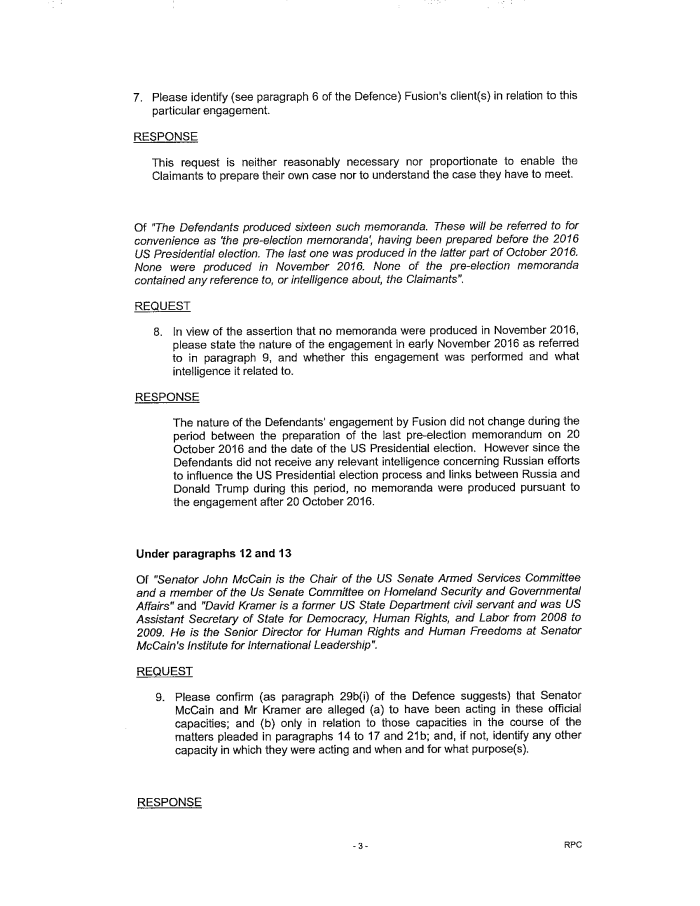John McCain faces questions in Trump-Russia dossier case
WASHINGTON
Sen. John McCain faces questions in a defamation lawsuit about leaks leading to publication of the now-infamous dossier that alleged Donald Trump’s campaign had connections to Russian operatives, McClatchy has learned.
The dossier compiled by former British spy Christopher Steele and his London firm, Orbis Business Intelligence Ltd., amounted to a collection of uncorroborated reports of collusion gathered as political research for sale to Trump’s opponents. It proved explosive when published by online news site BuzzFeed on Jan. 10.
Now, two lawsuits — one in the United States and a second in the U.K. — are being brought by lawyers for Aleksej Gubarev, a Cyprus-based Internet entrepreneur whom Steele’s Russian sources accused of cyber spying against the Democratic Party leadership.
According to a new court document in the British lawsuit, counsel for defendants Steele and Orbis repeatedly point to McCain, R-Ariz., a vocal Trump critic, and a former State Department official as two in a handful of people known to have had copies of the full document before it circulated among journalists and was published by BuzzFeed.
The court document obtained by McClatchy confirms that Sir Andrew Wood, a former British ambassador to Moscow and a Russia adviser to former Prime Minister Tony Blair, discussed the 35-page dossier with McCain.
“The Defendants considered that the issues were self-evidently relevant to the national security of the US, UK and their allies,” the document says, explaining why Steele and his partner, Christopher Burrows, felt it necessary to share the dossier’s findings.
Wood had told Britain’s The Guardian in January that McCain had reached out to him about the dossier, and had obtained it through other means. The court document confirms that Wood, Steele and former State Department official David Kramer decided together that new information gathered after the election should be shared with authorities in Britain and the United States.
A McCain spokesperson declined to comment Monday on the new court document, pointing instead to a Jan. 11 statement from the veteran senator about the dossier. “Upon examination of the contents, and unable to make a judgment about their accuracy, I delivered the information to the director of the FBI,” McCain had said then. “That has been the extent of my contact with the FBI or any other government agency regarding this issue.”
In recent congressional testimony, ex-FBI Director James Comey, fired by Trump amid a widening probe, acknowledged receiving the dossier from McCain on Jan. 6. Kramer, a former State Department official who until recently served as a senior director at Arizona State University’s McCain Institute for International Leadership, declined comment.
The British court documents are legal responses in the British suit and do not reflect the entire docket. The British suit is related to a similar lawsuit in the United States against online news site BuzzFeed.
At least a dozen national media organizations had a copy of the Steele dossier before it became public but hadn’t published details because much of the information had not been corroborated.
McClatchy was among them and subsequently published numerous reports on people named in the dossier, including a Russian diplomat and a supposed hacker who apparently is an imprisoned pedophile.
The dossier, without substantiation, said Gubarev’s U.S.-based global web-hosting companies, XBT and Webzilla, planted digital bugs, transmitted viruses and conducted altering operations against the Democratic Party leadership.
While one key name in the dossier was blackened out by BuzzFeed, Gubarev’s was not. He alleges that he was never contacted for comment, suffering reputational harm in the process.
In the court document, Steele’s barrister, Nicola Cain, argued that the portion of the dossier dealing with Gubarev, which came in weeks after Trump’s election and after Steele was no longer paid by his client for research, amounted to raw intelligence and was advertised as such. She did not return a call or email requests for comment.
Val Gurvits, an attorney leading the U.S. suit against BuzzFeed, dismissed the idea that Gubarev was just caught up in raw intelligence.
“The value of this document (dossier) is only if it is published,” said Gurvits. “It is absolutely of no value to anybody unless it is published. Slander is slander when you say it to one person.”
In a recent development in the U.S. lawsuit, BuzzFeed attorneys subpoenaed the former heads of the FBI, CIA and the Directorate of National Intelligence, seeking information about the dossier. Politico reported on June 30 that the demand for documents and testimony was aimed at learning the existence and scope of any federal investigation into Steele’s dossier.
Similarly, Gubarev’s attorney hopes to soon put Steele under oath, particularly about how the accusations about XBT and Webzilla came about.
“I plan to take the necessary steps to depose him as an important witness to my case,” Guvarits said, dismissing the chances of a settlement. “We have not had any serious settlement discussions in quite some time. My client certainly wants to take the case to trial. He wants his reputation back.”
The British court document also confirmed that Washington research firm Fusion GPS, co-founded by former Wall Street Journal reporter Glenn Simpson, had been hired to conduct opposition research by one of Trump’s GOP primary opponents. Later, Democrats paid for the same research on Trump’s past and alleged Russian ties.
Fusion GPS contracted with Steele, who had once worked as an undercover spy in Moscow. The court document lifted a veil on Washington’s inner workings, with Steele laying out how Fusion briefed select reporters on the material for which it and Steele had been paid to gather.
“The journalists initially briefed at the end of September 2016 by the Second Defendant (Steele) and Fusion at Fusion’s instruction were from the New York Times, the Washington Post, Yahoo News, the New Yorker and CNN,” Steele’s lawyers said, adding that he “verbally and in person” briefed the first three organizations in mid-October and a reporter from Mother Jones via Skype.
These reporters were not shown the dossier, the lawyers noted, and received instead a “disclosure of limited intelligence regarding indications of Russian interference” in the campaign. The information was off the record, meaning it could be used for further research but not published nor attributed.
Simpson declined comment. Steele declined past attempts to discuss his dossier with McClatchy.
--Greg Gordon and special correspondent Peter Stone contributed.
Kevin G. Hall: 202-383-6038, @KevinGHall
http://www.mcclatchydc.com/news/nation-world/national/article160622854.html





0 Comments:
Post a Comment
Subscribe to Post Comments [Atom]
<< Home